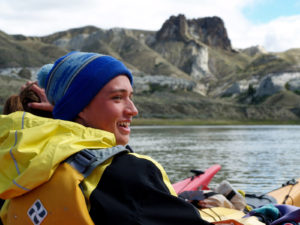 As we left the shore of the muddy Missouri, we crossed a cow burnt field and started up a draw. We worked our way through the rolling hills, which flanked the mouth of what would soon be Neat Coulee. We bobbed or way up canyon, slowly pristine white Virgelle Sandstone rose like the walls of Zion. Juniper and limber pine dominated the plant community, species hardly seen down the river. Moist, white sand replaced the gumbo mud and welcomed our softening steps as our heads craned skyward. My neck creaked with the stark contrast from staring at the flat surface of the ‘Mo’ for days on end. With this tinge of pain, I was flooded with confusion. Are we still in Montana? We surely didn’t teleport to the Southwest. But there is no way we are on the plains, or in the mountains for that matter. As we sit at the head of this bizarre slot, all it takes is a moment of presence and it all comes together.
As we left the shore of the muddy Missouri, we crossed a cow burnt field and started up a draw. We worked our way through the rolling hills, which flanked the mouth of what would soon be Neat Coulee. We bobbed or way up canyon, slowly pristine white Virgelle Sandstone rose like the walls of Zion. Juniper and limber pine dominated the plant community, species hardly seen down the river. Moist, white sand replaced the gumbo mud and welcomed our softening steps as our heads craned skyward. My neck creaked with the stark contrast from staring at the flat surface of the ‘Mo’ for days on end. With this tinge of pain, I was flooded with confusion. Are we still in Montana? We surely didn’t teleport to the Southwest. But there is no way we are on the plains, or in the mountains for that matter. As we sit at the head of this bizarre slot, all it takes is a moment of presence and it all comes together.
What do I mean by a moment of presence? Basically the simple awareness of where one is by feeling the soil, hearing the wind, and just engaging with the surroundings. The familiar can often let presence slip away, but an unexpected or large change snaps us back rather quickly. For me, the experience of Neat Coulee on the Missouri River was certainly one of those moments. The initial feelings were definitely unsettling, almost a loss of where I was. Such contrasting landscapes must mean a new place. In reality, however, it meant a deeper understanding of this complex place. This was not an anomaly, rather an important step in understanding the breaks. A billion years of processes have created this place and the experience it provides. It is these intimate interactions that create a sense of a place.
This is a phrase we often hear thrown around but rarely stop to think about what it means. There are many pieces to an individual’s sense of place, but it starts with simply being present. A sense of place is not an abstract or conceptualized idea. It cannot be defined by science or really even words. A sense of place is as simple as the feeling that you are home after a long day. It might just be a touch of fabric on your bed or the smell of the trees. Truly it is just an awareness of where you are. Without that small awareness, though, we lose our culture, traditions, values and roots. That is place.
On a grander scale, a sense of place means being an engaged participant where you live. We can develop a sense of place by exploring our world–both near and far–all it takes is walking out the door and paying attention. Through these explorations we will become invested in our neighborhoods and communities, we will know more about them and understand what they mean. As I sat in the sand of Neat Coulee, I was able gain a greater understanding of and connection to the mighty Missouri River and the state it is born in.